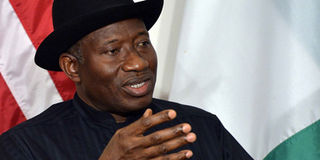Breaking News: At least 10 feared to have drowned in Makueni river
Africa treated fairly at UN meet

Nigeria President Goodluck Jonathan speaks to the media on the sidelines of the United Nations General Assembly in New York on September 23. African woes received a global focus at the meeting. PHOTO | JEWEL SAMAD |
What you need to know:
- Leaders call for reforms amid scathing attacks on five permanent members
- The UN supremo further called for the upholding of human dignity, the rule of law and the principles of the UN Charter in the face of the myriad devastating crises confronting the world as a whole.
The ongoing 69th session of United Nations General Assembly has put Africa in focus, particularly given that the current President of the assembly is Uganda’s Foreign Minister Sam Kutesa.
Kutesa was elected to the position on June 11, 2014, having earlier emerged as the unanimous candidate of the African Union’s Executive Council. The development followed Cameroonian Foreign Minister Pierre Moukoko’s withdrawal of his candidature, making an election at the AU level unnecessary.
For a change, during the ongoing UN meet, which opened in New York on September 16, Africa was clearly no longer being viewed as a kind of backwaters region perennially teeming with seemingly intractable woes.
Moreover, the continent is evidently not being perceived as one whose problems the rest of the world has to grudgingly lend a hand in resolving.
Rather, there have been repeated calls for all challenges to be considered from the same global perspective. Instead of singling out Africa as a region besieged by such problems as terrorism, violence and epidemics such as the still raging Ebola one, UN Secretary-General Ban Ki-moon set the tenor during the proceedings of the session when he called on world leaders to unite in ‘(a) time of turmoil’.
UPHOLDING HUMAN DIGNITY
The UN supremo further called for the upholding of human dignity, the rule of law and the principles of the UN Charter in the face of the myriad devastating crises confronting the world as a whole.
“The world is facing multiple crises,” Mr Ban said prior to the opening of the UN gathering, while making it clear that crises were widespread beyond Africa. Adding that world leaders must act against serious threats to global and regional peace and security, Mr Ban singled out the long-drawn-out crises in Ukraine, Libya, Mali, South Sudan and the Central African Republic.
The need for a global perspective in resolving crises was further underscored by Estonian President Toomas Hendrik Ilves, who specifically pointed out that terrorism, climate change, human rights violations and the spread of the Ebola virus continue to be global challenges.
President Susilo Bambang Yudhoyono of Indonesia, on the other hand, called for an end to the game of “us” against “them” that pits the developed — mainly western world— against other nations. He also called for the eradication of divisions within the UN system and the creation of a new, equitable world order.
Turkish President Tayyip Erdogan, who on Wednesday lashed out at “the inability of the UN Security Council to stop the violence in Syria”, also made a pitch for reforms of the United Nations.
Pointing out that the veto power of one country could influence the decisions of the entire UN body, President Erdogan described as “unacceptable” the massive power wielded by the five permanent members of the Security Council— China, France, Russia, UK and the US.
“The world is more than five,” Mr Erdogan said, adding that what humanity needed most was “sustainable development with equity”, rather than “development that measures progress in terms of material provisions alone, and ends up dehumanising and marginalising our citizens.”
Also addressing the General Assembly on Wednesday, President Didier Burkhalter of the Swiss Confederation argued that strengthening international security and reforming the organisation should be the two main priorities at the United Nations.
He also underscored the importance of finding a political solution to the crisis in Syria, while also calling on the UN Security Council to refer the situation of Syria to the ICC where those who have committed injustices can be held to account.
During the meet, the presidents of countries like Kenya and Nigeria raised the alarm about the threats their countries faced from growing terrorist threats.
For his part, Sierra Leone’s President Ernest Bai Koroma, addressing the UN General Assembly via a video link from Freetown on Thursday, said that the Ebola outbreak in West Africa “is worse than terrorism.”
Appealing for international support to contain the spread of the deadly pandemic, he also called on the world to consider the outbreak a threat to all.





